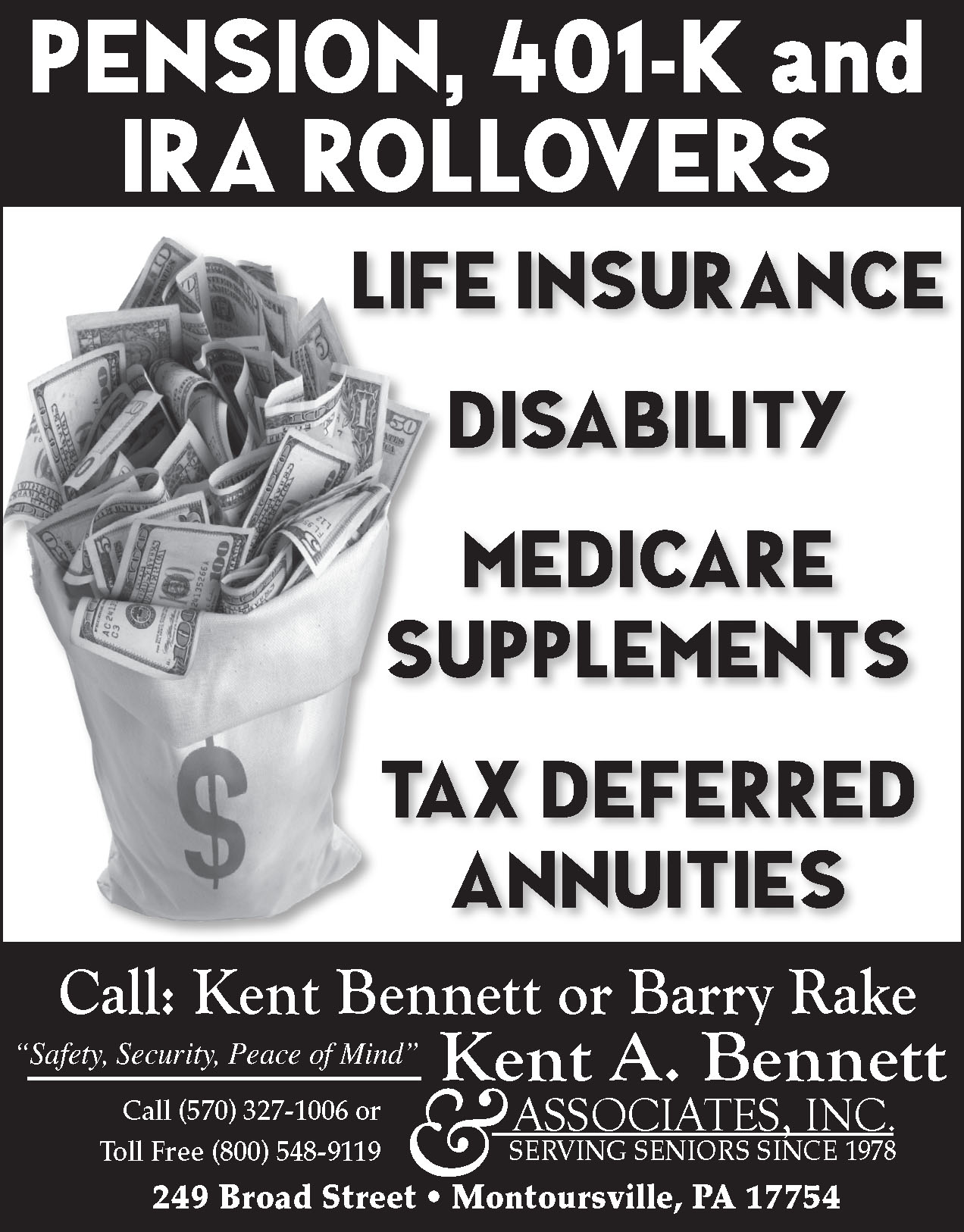There are a few facts I would like to point out before sharing my opinion on the two referendum questions concerning the form of government for the City of Williamsport appearing on your November ballot.
1. I currently serve as a City Councilman in your government.
2. I am not running to be elected for a second term. This is not because I do not have a desire to serve, but due to circumstantial reasons including my plans to move to our family’s “homestead” outside the city.
3. I voted to place the question on the ballot concerning an Optional Third Class City Charter Commission over a year ago because I felt that voters had a right to elect a commission to study this issue if they chose to do so (which they did). However, this does not mean they have decided that changing the form of government is necessary.
4. In my evaluation of the three options available to us in November (two proposed changes or retaining the current form), I have placed the highest priority on two concepts: Accountability and Efficiency (in that order).
Now to my opinion.
On the Home Rule Charter
In its Final Report, the Government Study Commission argues that a new “Home Rule Charter” is the “best option for Williamsport” in opposition to the powers already granted by the state in 1957.
The first argument is that the Proposed Home Rule Charter offers a “clear organizational structure and flow of city government.” Our current form of government, however, already allows for such an organizational structure. I would agree that we need a clearer Administrative Code, but I do not see the necessity of a new Charter to accomplish this.
The second argument is that “a non-elected, professional administrative management reduces the appearance of conflicts of interest and the appearance of impropriety.” I agree with this argument; however, I do not see the need for a new Home Rule Charter to accomplish this. The Optional Third Class City Charter Law of 1957 already grants us this ability.
The third argument is that the Proposed Home Rule Charter would provide “flexibility in the tax structure in order to bring in revenue and reduce property taxes.” I cannot dispute this argument. Our current form of government does not give us such flexibility. I do believe our current tax structure is not as fair as it could be, and some kind of flexibility could be a great asset. I would have liked to see this benefit expanded upon in the report.
The fourth argument is that the Proposed Home Rule Charter would provide a clear foundational document, i.e. a “charter.” Third Class cities under the Optional Third Class City Charter Law of 1957 have already been provided a charter by the state. While Williamsporters may not have drafted the actual wording of the charter, they did approve it as provided.
The fifth argument is that the Proposed Home Rule Charter allows a “less onerous process” to make amendments providing more flexibility to meet the needs of a changing city. While adaptation is important, I do not believe that a less onerous process is needful. If we “streamline” the “onerous” process of change and adaptation, we will cut out the needful process of accountability in vetting proposed changes.
The report also states that the cost of a full-time City Manager and Mayor will be offset by “efficiency and the elimination” of benefits for “part-time” Council members and others. First, I am concerned that a full-time Mayor and a full-time Manager will have overlapping roles. The proposed charter does specify the duties of both, but they seem contradictory. The Mayor is to be the “Chief Executive Officer,” yet he/she is also a member of Council making him/her a member of both the Legislative and Executive branches at the same time. Those who feel “separation of powers” as important will struggle with this concept.
Secondly, eliminating benefits for Council members may help to pay for a full-time Manager, but in my opinion, that specific issue should be debated and decided on its own, not in the development of a new charter. Because this issue can already be addressed within our current form of government, I feel that the interjection of Council health benefits in a debate over a new charter is the exploitation of a “hot-button” issue in order to garner votes.
The new Proposed Home Rule Charter requires the City to establish and maintain an “Official City Website.” Again, is this a charter issue or simply a management issue? I must say that I feel the Government Study Commission is using another “hot-button” issue to garner votes for a new home rule charter.
One other area of concern is the removal of the elected offices of Treasurer and Controller. While bringing these functions into the appointed Finance Department may streamline the process, it also undercuts a measure of accountability that Williamsporters have over the use of their own tax monies.
Finally, the Government Study Commission by law was given up to 18 months to study, recommend and prepare a new charter proposal. However, the Commission used only half (9 months) of that time to draft the potential foundation of our city government. The Final Report was certified by the City Clerk on the last day legally possible to be included on the November ballot. In my opinion, this proposal seems unnecessarily rushed and needs more refining.
On the Council-Manager Form
In essence, this plan provides for a Council appointed City Manager acting as the Executive branch. In its Final Report, the Charter Commission has recommended that the Mayor be appointed by the Council (as opposed to being elected by the voters) and would “preside at all meetings of City Council” while the City Manager would execute the laws and ordinances established by Council. Council would have the authority to “hire” and “fire” the City Manager following “certain procedural requirements including the possibility of a hearing” if necessary.
The Final Report states that “a professional manager would be expected to bring increased efficiency and to eliminate duplicative work between departments.” There is something to be said for a professional executing a $25 million budget and managing all the City employees. Could a trained professional provide more efficiency than what a politician could? Perhaps, but of course, that depends upon the actual individuals under consideration.
A second benefit mentioned is the elimination of the potential disruption that “the election cycle” has on the “business of operating the City.” To this possible benefit, I must concur. The political maneuvering and posturing during campaigns can negatively affect what should be common sense business decisions. It may also contribute to instability and insecurity in city employees during election years. When this is the case, it can “inhibit strategic planning.” The motivation for political manipulation in city business is less likely when the chief administrator is not campaigning to maintain his/her power.
How then is the City Manager held accountable? According to the Charter Commission interpretive statement, the City Council “will have the ability – on behalf of residents and other taxpayers – to make a performance-based evaluation of the Managers day-to-day administration of city government, outside the four-year municipal election cycle.” This is where the balance between efficiency and accountability must be weighed. While the accountability is one level removed from the voter, the availability of the accountability measure (firing) is not limited to every four years (municipal election). This balance is, perhaps, the crux of the issue which the voters must decide in November.
What about the Mayor? As stated, “Council shall elect one of their number as Mayor, to preside over Council.” This election is by ballot and mostly for ceremonial purposes. Additionally, Council is to act as a “body” at all times. This means that no one member (including the Mayor) may “seek individually to influence official acts of the City Manager or any other officer of the City.” The City manager would be the chief executive officer, as the Mayor is now, and he/she would have great authority to manage the city as he/she sees fit.
In my findings, the benefits touted in the Final Report of the Charter Commission are clearly dependent upon an actual change in our current form of Government from Strong Mayor to Council-Manager. The Charter Commission did not address some complaints voiced concerning currently perceived deficiencies (e.g., Council benefits, the city website, etc.). It is assumed that a fundamental change in form will enable the professional and administrative changes necessary to address these issues. The voters will decide if this structural change is necessary.
On the Strong Mayor Form
While both commissions were charged with studying our current form of government, neither final report addressed any benefits of the Mayor-Council Plan A (commonly referred to as the Strong Mayor Form) or provided any evaluation of our current government. As an elected Councilman serving under this law, I will do so now.
Similar to the Federal Government, Council is the Legislative branch of our local government. It has the power to create Ordinances, approve all things financial (e.g., budgets, contracts, taxes), investigate the conduct of departments, etc. and provide advice and consent to many of the Mayor’s appointments. The Mayor as the Executive branch “executes” the ordinances and budgets as prescribed by the Council. The Mayor has great freedom within the bounds of the law to administrate the city government as he/she sees fit.
There are benefits to having this “balance of powers” in that there is always a “competition” of sorts, which drives us to not only hold each other accountable but also to constantly evaluate and test the performance of our government. This “competition,” however, is not always a fair one. It may lead to cheap, political games, which politicians tend to play to get an edge over an opponent or win favor. In our small town, this can be dangerous where connections are so close. The benefit of “accountability” in this instance may sometimes be lost due to instability and inefficiency.
But how is Williamsport currently performing under this form? I do believe there are certain deficiencies in the function of our current government, however, at this time I am not convinced that these deficiencies are due to its form. In fact, I believe Council has been provided by law more power than it has traditionally exercised, and could thereby create a better “balance” than is perceived today.
Organizational flow, term limits, director and officer qualifications, benefit packages and salaries, among other concerns, can all be addressed within the current Strong Mayor Form of government. I feel that without exercising the full potential of our current form, we cannot determine if we truly need a change. Do I feel that something needs to change? Yes. But I do not feel that the drastic change of government form is needful — yet.
On the Ballot Questions
As Referendum questions, each requires a simple “yes” or “no.” Each voter should evaluate each question and the proposal it represents separately. While many may be confused by the entire issue, they need not be. Keep a straightforward outlook, and vote each question on its own merit.
If your opinion is that Williamsport should adopt the exact “home rule charter” as proposed by the Government Study Commission, you should vote “yes” on that question. If not, simply vote “no” on this question.
If you believe that Williamsport should adopt the proposed Council-Manager Form as outlined in the Optional Third Class City Charter Law, you should vote “yes” on that question. If not, then simply vote “no” on this question.
If you would rather retain our current form of government, you would vote “no” on both questions.
Many are asking, what if both referendum questions get a majority vote? As this is uncharted water, we cannot tell exactly what will happen, but we suspect the courts will need to decide. In any case, this should not affect your vote.
Let your voice be heard. Do not skip the questions or stay home. Remember, each vote “skipped” gives more power to those who do voice their opinion. Just as each commission has given their final report, so you and I must give ours.
(This abbreviated letter can be read in its entirety on facebook.com/HendersononCouncil)
Joel Henderson
jcemhenderson@gmail.com
Williamsport City Council




1 Comment
Lind
October 31, 2018, 7:46 pmThank you Joel for explaining the suggested forms of city gov’t that voters will vote for. My hubby & I support the strong mayor form of gov’t. We feel this whole process has been a confusing mess used to keep Mayor Campana from running again. The majority of Williamsport citizens voted for him 3 terms ! Let the citizens of Williamsport vote to elect our mayor !
REPLY